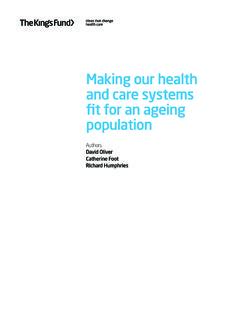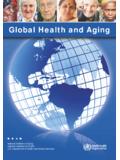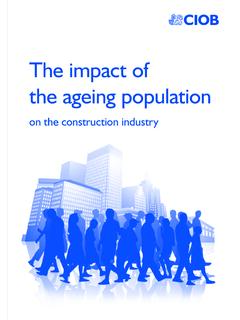Transcription of The role of nurses in promoting healthy ageing
1 I of 3 KEY STATEMENT The Australian College of Nursing (ACN) believes all nurses (Registered and Enrolled) have a critical role in promoting and supporting healthy ageing for all older Australians. nurses have the essential expertise in critical thinking, clinical assessment, clinical decision-making, care coordination and clinical and managerial leadership necessary to support older Australians to age well. In Australia, nurses support older Australians across a range of settings including community, general practice, residential care, acute care and correctional facilities. nurses in these settings take the lead in supervising and mentoring unlicensed staff. In many of these settings, the focus of health care is curative rather than preventative or considerate of health promotion, limiting the opportunity for reablement and rehabilitation.
2 More broadly, supporting older Australians to promote health includes understanding the role of families and accessing appropriate health and social care Australian College of Nursing believes that: Older Australians must be supported to live in the setting of their choice and receive services that promote independence, meet their preferences and facilitate social connection. nurses should identify opportunities to support healthy ageing initiatives that include reablement programmes, in all settings. nurses must be competent to recognise and respond to deterioration, cognitive and functional decline in older Australians and be skilled and educated to provide appropriate care. Nursing curriculums should be age-inclusive and support clinical placements in aged care settings.
3 Nurse-led models of care should be developed, implemented and evaluated to support healthy ageing and inform policy for older Australians. Career development pathways should be developed and implemented to support nurses to specialise in healthy ageing for older Australians. nurses should be skilled and educated to provide quality palliative and end of life care for older Australians. nurses play a significant role in promoting older Australians functional, physical, social engagement and mental wellness and providing high quality safe care. nurses should be educated and professionally prepared to identify and challenge stereotypes that promote ageist attitudes. nurses play a key role in the identification and mandatory reporting of elder abuse. Older Australians with diverse characteristics and life experiences have equitable access to information and services to meet their individual needs.
4 BACKGROUND An ageing AustraliaAustralia, like many developed countries, has an ageing population. In 2017, approximately million people (15% of Australia s total population) were aged 65 and over. This is expected to increase to million older people in Australia (22% of the population) by 2057 1. Older Australians display the same diversity as the broader population with over 36% born overseas and one in three from a non-English speaking country. There are over 100,000 people from Aboriginal and Torres Strait Islander communities and these individuals have health care and support needs that are different from other older Australians. More than one in ten have diverse sexual orientation, gender identity or intersex characteristics and the proportion of people living with HIV over the age of 55 is expected to be by 2020.
5 More than one in ten older Australians live in regional, rural and remote communities and experience significant financial or social disadvantage. This diversity may impact on some older Australians capacity to access and engage with services to the 2014 15 National Health Survey (NHS), nearly three-quarters (73%) of older Australians (aged 65 and over) reported they had good, very good or excellent health 3. However, many older Australians live with chronic conditions, in particular cardiovascular, neurological, musculoskeletal conditions, respiratory conditions or diabetes 3 and one in twelve older Australians have four or more chronic diseases 2. In 2016, 66% of deaths registered in Australia were among people aged 75 or over with the leading cause of death for all older Australians being coronary heart disease, followed by dementia and Alzheimer s disease, cerebrovascular disease, chronic obstructive pulmonary disease and lung cancer role of nurses in promoting healthy ageingApproved 22/3/2019 Review March 2020 POSITION STATEMENT 2 of 3 While many older Australians live independently without support, the Australian aged care system provides a comprehensive range of services if required.
6 The Commonwealth Home Support Programme (CHSP) provides a basic level of care at home, and supported more than 720,000 people aged 65 and over in 2016 17 5. The Home Care Packages Programme assists frail older people to remain at home for longer. At 30 June 2017, there were around 71,400 Home Care recipients; the average age at admission into Home Care was years. The highest level of care available to older Australians is residential aged care, which offers accommodation as well as health care for people no longer able to live at home 6. Like all Australians, those aged 65 and older have access to general practitioners and acute hospital services through Medicare. In 2016 17 approximately one-fifth of emergency department (ED) presentations were people aged 65 and older and these presentations increased for those aged 85 and over AgeingThe goal of most Australians is to live well and maintain independence as they age.
7 Regardless of whether older people are at home, receiving services in primary or acute care or living in residential aged care, nurses are a primary provider of care for older Australians. As such, nurses must understand the ageing process and the needs of older Australians to facilitate healthy ageing and respect the person s dignity and personhood. They need to understand the diversity of older people and their preferences concerning health promotion and care services. The World Health Organization defined healthy ageing as the process of developing and maintaining the functional ability that enables wellbeing in older age, where functional ability comprises the health-related attributes that enable people to be and to do what they have reason to value including a person s ability to: meet their basic needs be mobile build and maintain relationships contribute to ability is central to this definition.
8 Functional ability refers to the intrinsic capacity of the individual, relevant environmental characteristics and how they interact 7. nurses are well placed to support healthy ageing . The following section identifies structures that can support this role. The role of the nurse to support healthy ageing The code of conduct for nurses (the code) sets out the legal requirements, professional behaviour and conduct expectations for nurses in all Australian practice settings 8. The principles of the code apply to any work where a nurse uses nursing skills and knowledge, whether paid or unpaid, clinical or non-clinical. The code includes seven principles of conduct, grouped into domains, each with an explanatory value details of these are available through the Nursing and Midwifery Board of Australia (NMBA) website at Those that are specifically relevant to promoting healthy ageing of older Australians include: Person-centred practice nurses provide safe, person-centred and evidence-based practice for the health and wellbeing of people and, in partnership with the person, promote shared decision-making and care delivery between the person, nominated partners, family, friends and health professionals.
9 Cultural practice and respectful relationships nurses engage with people as individuals in a culturally safe and respectful way, foster open and honest professional relationships, and adhere to their obligations about privacy and confidentiality. Health and wellbeing nurses promote health and wellbeing for people and their families, colleagues, the broader community and themselves in a way that addresses health inequality. In addition to the code, which is not specific to the care of older people, national and international competencies to support healthy ageing have been developed 9 -11. These include: promoting and demonstrating a positive view of ageing including respect and empathy for the older person 10. Effective communication including verbal and documentation skills and assessing the barriers older adults encounter receiving, understanding and giving information 9 -11.
10 Reflective practice skills 10. Knowledge of the aged care system and available aged care services including, facilitating transitions in care, including acute, community-based, and long-term care for older adults and their families 9 -11. Maximising health outcomes through knowledge of the ageing process, age related conditions and illnesses including complex as well as chronic conditions, dementia, preventative care 9, 10. Recognition of the complex interaction of acute and chronic co-morbid physical and mental conditions and associated treatments common to older adults 11. Skills to provide optimal pain management and palliative care 9. Enabling older Australians access to technology 9. Incorporate professional attitudes, values, and expectations about physical and mental aging in the provision of person-centred care for older adults and their families 11.







